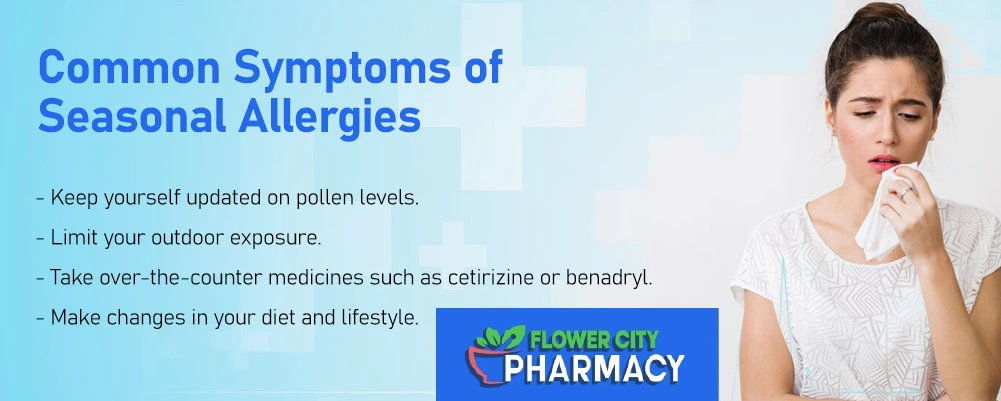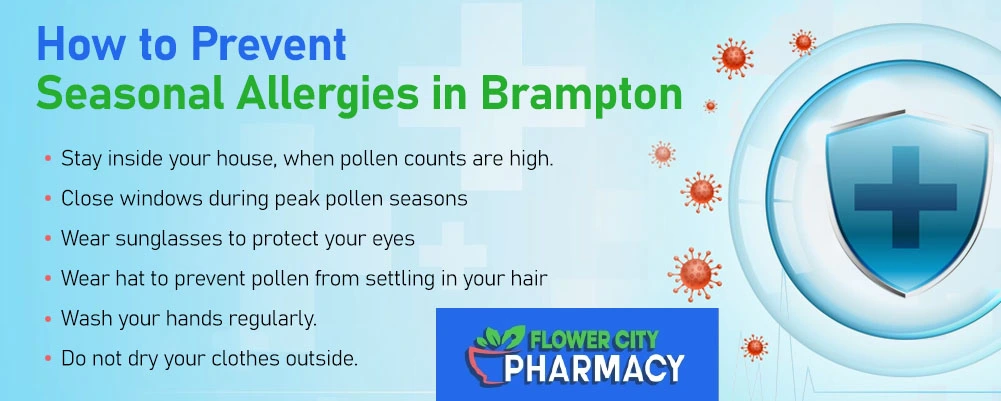Published on: 17 Mar 2025
Table of Contents
Introduction
Many people in Brampton suffer from seasonal allergies, especially in the spring and fall. Managing seasonal allergies can be difficult, particularly in a city like Brampton where pollen counts change throughout the year.
Some common symptoms of seasonal allergies are sneezing, itchy eyes or runny nose.
Effective management of these symptoms are necessary like,
- Keep yourself updated on pollen levels.
- Limit your outdoor exposure.
- Take over-the-counter medicines such as cetirizine or benadryl.
- Make changes in your diet and lifestyle.

What Are Seasonal Allergies?
A seasonal allergy also known as “Hay fever”. It is basically an allergic reaction that occurs only at specific periods of the year. It generally happens when certain allergens are present in the environment.
Common triggers of seasonal allergy are:
- Pollen which comes from trees, grasses and weeds.
- Mold spores which came from outside fungus.
- Dust mites can create problems when humidity levels are higher.
Common Causes of Seasonal Allergies in Brampton
Tree Pollen
Tree pollen is one of the most common causes for seasonal allergies. In Spring, when trees discharge pollen into the environment to fertilize other trees. It is very lightweight. People even from a distance can be affected by tree pollen because it can easily get carried away by wind.
Common trees in Brampton that generate significant amount of pollen are,
- Birch
- Maple
- Oak
- Poplar
Grass Pollen
Grass causes the majority of late spring and summer pollen allergy symptoms from April to early June. Grasses, like other plants, generate a tiny dust called pollen.
The most frequent grass allergies in Brampton are:
- Kentucky bluegrass
- Timothy grass
- Orchard grass
Weed Pollen
Weed pollen are the small particles produced by diverse weed species throughout their reproductive cycle. Weed pollen occurs in late summer and fall. Ragweed is the most common allergic weed pollen.
Other common weed pollens include:
- Dandelion
- Plantain
- Nettle
Mold Spores
Mold spores are small reproductive units produced by mould fungus. They live both indoors and outdoors and preferably in moist, humid conditions.
They are commonly found in:
- Fallen leaves
- Wet grass
- Damp basements
- Poorly ventilated homes

Symptoms of Seasonal Allergies
- Congestion
- Sneezing
- Itchy eyes
- Runny nose and eyes
- Fatigue
- Coughing
How to Identify Allergy Symptoms
Allergy symptoms depend upon various allergens like pollen, dust, food or insects.
- Respiratory allergies: Sneezing, nasal congestion, itchy or watery eyes.
- Skin allergies: Itchy, red skin, or rashes.
- Food allergies: Swelling in the throat, stomach pain, nausea, or vomiting.
- Insect Sting allergies: Swelling, redness, and pain.
- Drug allergies: Skin rashes, fever, difficulty in breathing.
Best Treatments for Seasonal Allergies in Brampton
- Over-the-Counter Allergy Medications:
- Antihistamines like Cetirizine and Loratadine for Sneezing, Runny Nose, and Itchy Eyes.
- Otrivin to reduce nasal congestion.
- Nasal Steroid Sprays to reduce inflammation.
- Natural Remedies for Allergy Relief
- Use Saline nasal spray to remove pollen or dust from the nasal passages.
- Take one teaspoon of raw honey daily.
- Inhale steam to open nasal passages.
- Herbal tea like Ginger tea and Chamomile tea to reduce inflammation.
- Take probiotic rich food like yogurt to regulate the immune system.
- Include leafy vegetables, turmeric and garlic into your diet.
- Stay hydrated.
How to Prevent Seasonal Allergies in Brampton
- Stay inside your house, when pollen counts are high.
- Close windows during peak pollen seasons.
- Wear sunglasses to protect your eyes.
- Wear hat to prevent pollen from settling in your hair.
- Wash your hands regularly.
- Do not dry your clothes outside.
- Use a dehumidifier especially in bathrooms.
When to See a Doctor for Allergies
Consult a doctor,
- If home remedies don’t help your itchy eyes, runny nose or sneezing.
- If your daily activities, sleep, or job are being impacted by allergies.
- If you get ear infections or a buildup of fluid in your ears.
- If you are experiencing shortness of breath or chest tightness.
- If you have to take nasal sprays for longer than three days.
- If you have red or itchy eyes.
- If you need to use your inhaler more frequently than normal.
- If you are facing problems in breathing.
Conclusion
Seasonal allergies impact our daily lives. It becomes difficult to enjoy outdoor activities. Making small lifestyle changes like using air purifiers, keeping ourselves hydrated, and keeping windows closed during pollen season, can really help in reducing symptoms.
We at Flowercity Pharmacy, provide a variety of over-the-counter drugs, natural therapies, and professional guidance to help you manage allergy symptoms efficiently.
We also provide a wide range of over-the-counter products to help you in managing the seasonal allergy symptoms. You can also take flu shots to provide you immunity against these allergic reactions.
Visit our pharmacy today or contact us for professional advice on controlling seasonal allergies.





